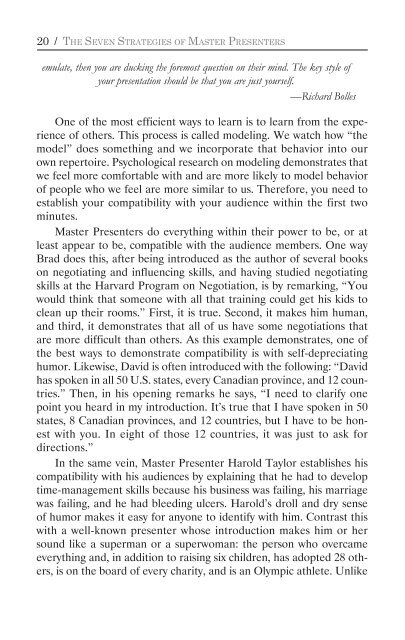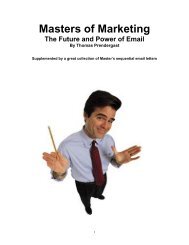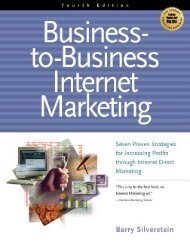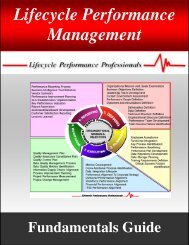- Page 2 and 3: Franklin Lakes, NJ
- Page 4 and 5: Brad dedicates this book to his thr
- Page 6 and 7: CONTENTS Foreword by Ted Corcoran,
- Page 8 and 9: FOREWORD 7 Foreword / 7 Ninety-eigh
- Page 10 and 11: PREFACE 9 Preface / 9 More than $6
- Page 12 and 13: INTRODUCTION 11 Introduction / 11 P
- Page 14 and 15: Introduction / 13 pitchman on telev
- Page 16 and 17: Introduction / 15 Just as astronome
- Page 18 and 19: Introduction / 17 4. Caring 5. Dyna
- Page 22 and 23: Introduction / 21 the superman or s
- Page 24 and 25: Introduction / 23 how they got to b
- Page 26 and 27: Introduction / 25 How Master Presen
- Page 28 and 29: Introduction / 27 8. How effective
- Page 30 and 31: Know Thy Audience / 29 It was, afte
- Page 32 and 33: If so, what did you learn? What are
- Page 34 and 35: Know Thy Audience / 33 When using t
- Page 36 and 37: Know Thy Audience / 35 Brad found t
- Page 38 and 39: Know Thy Audience / 37 library—li
- Page 40 and 41: 2. The Experience Level of the Audi
- Page 42 and 43: Know Thy Audience / 41 said that it
- Page 44 and 45: Know Thy Audience / 43 the group an
- Page 46 and 47: Know Thy Audience / 45 was receivin
- Page 48 and 49: Prepare Outstanding Content / 47 ST
- Page 50 and 51: Prepare Outstanding Content / 49 Li
- Page 52 and 53: Prepare Outstanding Content / 51 It
- Page 54 and 55: Prepare Outstanding Content / 53 T
- Page 56 and 57: Prepare Outstanding Content / 55 be
- Page 58 and 59: Prepare Outstanding Content / 57 of
- Page 60 and 61: Prepare Outstanding Content / 59 Lo
- Page 62 and 63: Prepare Outstanding Content / 61 th
- Page 64 and 65: Prepare Outstanding Content / 63 fo
- Page 66 and 67: Prepare Outstanding Content / 65 ne
- Page 68 and 69: Prepare Outstanding Content / 67 pl
- Page 70 and 71:
Prepare Outstanding Content / 69 th
- Page 72 and 73:
Prepare Outstanding Content / 71 So
- Page 74 and 75:
Prepare Outstanding Content / 73 to
- Page 76 and 77:
Simulations Prepare Outstanding Con
- Page 78 and 79:
Prepare Outstanding Content / 77 wi
- Page 80 and 81:
Prepare Outstanding Content / 79 ho
- Page 82 and 83:
Prepare Outstanding Content / 81 Pr
- Page 84 and 85:
Use Superior Organization / 83 1. A
- Page 86 and 87:
Use Superior Organization / 85 mill
- Page 88 and 89:
Use Superior Organization / 87 now:
- Page 90 and 91:
Use Superior Organization / 89 Figu
- Page 92 and 93:
Step 2: Develop Goals and Objective
- Page 94 and 95:
Use Superior Organization / 93 Tran
- Page 96 and 97:
6 Types of Transitions Use Superior
- Page 98 and 99:
Use Superior Organization / 97 have
- Page 100 and 101:
Use Superior Organization / 99 well
- Page 102 and 103:
Use Superior Organization / 101 spe
- Page 104 and 105:
Use Superior Organization / 103 Ed
- Page 106 and 107:
Develop Dynamic Delivery / 105 STRA
- Page 108 and 109:
Develop Dynamic Delivery / 107 2. U
- Page 110 and 111:
Develop Dynamic Delivery / 109 reme
- Page 112 and 113:
Develop Dynamic Delivery / 111 4. A
- Page 114 and 115:
Develop Dynamic Delivery / 113 this
- Page 116 and 117:
Develop Dynamic Delivery / 115 For
- Page 118 and 119:
Develop Dynamic Delivery / 117 fran
- Page 120 and 121:
Develop Dynamic Delivery / 119 have
- Page 122 and 123:
Develop Dynamic Delivery / 121 8. U
- Page 124 and 125:
Develop Dynamic Delivery / 123 it.
- Page 126 and 127:
Develop Dynamic Delivery / 125 You
- Page 128 and 129:
Develop Dynamic Delivery / 127 how
- Page 130 and 131:
Develop Dynamic Delivery / 129 both
- Page 132 and 133:
EXERCISE 4-9 Develop Dynamic Delive
- Page 134 and 135:
Develop Dynamic Delivery / 133 cred
- Page 136 and 137:
Develop Dynamic Delivery / 135 You
- Page 138 and 139:
Make It Memorable, Actionable, and
- Page 140 and 141:
Make It Memorable, Actionable, and
- Page 142 and 143:
Make It Memorable, Actionable, and
- Page 144 and 145:
Make It Memorable, Actionable, and
- Page 146 and 147:
Make It Memorable, Actionable, and
- Page 148 and 149:
EXERCISE 5-2 Make It Memorable, Act
- Page 150 and 151:
Make It Memorable, Actionable, and
- Page 152 and 153:
Make It Memorable, Actionable, and
- Page 154 and 155:
Make It Memorable, Actionable, and
- Page 156 and 157:
Make It Memorable, Actionable, and
- Page 158 and 159:
Make It Memorable, Actionable, and
- Page 160 and 161:
Make It Memorable, Actionable, and
- Page 162 and 163:
Make It Memorable, Actionable, and
- Page 164 and 165:
Make It Memorable, Actionable, and
- Page 166 and 167:
EXERCISE 5-6 Make It Memorable, Act
- Page 168 and 169:
Make It Memorable, Actionable, and
- Page 170 and 171:
Make It Memorable, Actionable, and
- Page 172 and 173:
Make It Memorable, Actionable, and
- Page 174 and 175:
Manage Yourself, Difficult Particip
- Page 176 and 177:
Manage Yourself, Difficult Particip
- Page 178 and 179:
Manage Yourself, Difficult Particip
- Page 180 and 181:
Manage Yourself, Difficult Particip
- Page 182 and 183:
EXERCISE 6-2 Manage Yourself, Diffi
- Page 184 and 185:
Manage Yourself, Difficult Particip
- Page 186 and 187:
Manage Yourself, Difficult Particip
- Page 188 and 189:
Manage Yourself, Difficult Particip
- Page 190 and 191:
Manage Yourself, Difficult Particip
- Page 192 and 193:
Manage Yourself, Difficult Particip
- Page 194 and 195:
Manage Yourself, Difficult Particip
- Page 196 and 197:
Manage Yourself, Difficult Particip
- Page 198 and 199:
Manage Yourself, Difficult Particip
- Page 200 and 201:
Manage Yourself, Difficult Particip
- Page 202 and 203:
Manage Yourself, Difficult Particip
- Page 204 and 205:
Manage Yourself, Difficult Particip
- Page 206 and 207:
Manage Yourself, Difficult Particip
- Page 208 and 209:
Total Quality Improvement / 207 The
- Page 210 and 211:
Total Quality Improvement / 209 giv
- Page 212 and 213:
Total Quality Improvement / 211 had
- Page 214 and 215:
Total Quality Improvement / 213 rea
- Page 216 and 217:
2. The Presentation Evaluation Form
- Page 218 and 219:
Total Quality Improvement / 217 3.
- Page 220 and 221:
Total Quality Improvement / 219 tha
- Page 222 and 223:
Total Quality Improvement / 221 adv
- Page 224 and 225:
Total Quality Improvement / 223 be
- Page 226 and 227:
Total Quality Improvement / 225 min
- Page 228 and 229:
More specific instructions. Add 10
- Page 230 and 231:
Total Quality Improvement / 229 Dav
- Page 232 and 233:
Total Quality Improvement / 231 des
- Page 234 and 235:
Total Quality Improvement / 233 We
- Page 236 and 237:
Total Quality Improvement / 235 Ask
- Page 238 and 239:
Total Quality Improvement / 237 Ear
- Page 240 and 241:
Total Quality Improvement / 239 tha
- Page 242 and 243:
The Power of Lifelong Learning / 24
- Page 244 and 245:
The Power of Lifelong Learning / 24
- Page 246 and 247:
The Power of Lifelong Learning / 24
- Page 248 and 249:
The Power of Lifelong Learning / 24
- Page 250 and 251:
The Power of Lifelong Learning / 24
- Page 252 and 253:
The Power of Lifelong Learning / 25
- Page 254 and 255:
The Power of Lifelong Learning / 25
- Page 256 and 257:
The Power of Lifelong Learning / 25
- Page 258 and 259:
The Power of Lifelong Learning / 25
- Page 260 and 261:
The Who’s Who of Master Presenter
- Page 262 and 263:
The Who’s Who of Master Presenter
- Page 264 and 265:
The Who’s Who of Master Presenter
- Page 266 and 267:
References / 265 Dawson, Roger. Sec
- Page 268 and 269:
References / 267 Safire, William an
- Page 270 and 271:
1. 2. 3. 4. The Master Negotiator
- Page 272 and 273:
1. 2. 3. 4. The Master Negotiator
- Page 274 and 275:
Checklists / 273 _____ Cables and w
- Page 276 and 277:
CHAPTER NOTES 275 Chapter Notes / 2
- Page 278 and 279:
Chapter Notes / 277 9. Kotter, John
- Page 280 and 281:
Chapter Notes / 279 13. Broad, Mary
- Page 282 and 283:
action plan, developing, 163 action
- Page 284 and 285:
Hanson, Mark Victor, 22, 91 Harris,
- Page 286 and 287:
Slight Edge Technique, 14, 23 SMART
- Page 288 and 289:
McRae and Brooks Seminars: Helping










